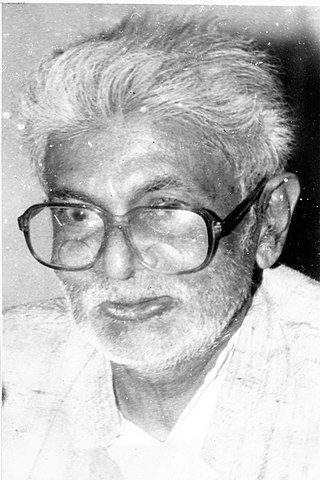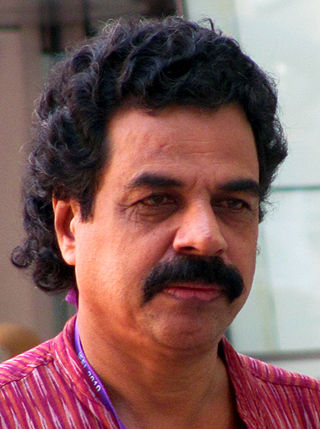
Malayalam, the lingua franca of the Indian state of Kerala and the union territories of Lakshadweep and Puduchery, is one of the six classical languages of India. Malayalam literature comprises those literary texts written in Malayalam, a South-Dravidian language spoken in the Indian state of Kerala. The first travelogue in any Indian language is the Malayalam Varthamanappusthakam, written by Paremmakkal Thoma Kathanar in 1785. Malayalam literature has been presented with 6 Jnanapith awards, the second-most for any Dravidian language and the third-highest for any Indian language.

Mundattuchundayil Paul Scaria, popularly known as PaulZacharia or Zacharia, is an Indian writer of Malayalam literature. Known for his body of literary works composed of short stories, novellas, travelogues, screenplays, essays, columns and children's books, Zacharia is a distinguished fellow of Kerala Sahitya Akademi. He is also a recipient of the Ezhuthachan Puraskaram, Kendra Sahitya Akademi Award and the Kerala Sahitya Akademi Award for Story.

Koloth Thattarath Sukumaran, popularly known as Sukumar Azhikode was an Indian academic, orator, critic and writer of Malayalam literature, known for his contributions to Malayalam language and insights on Indian philosophy. He was a scholar in Sanskrit, Malayalam, and English languages and his work, Tatvamasi, published in 1984, is a notable work for its detailed interpretation of Indian philosophy, Vedas and Upanishads. He was a recipient of several honours including Sahitya Akademi Award, Kerala Sahithya Akademi Award, Vayalar Award, Vallathol Award and Ezhuthachan Puraskaram, the highest literary award of the Government of Kerala. The Government of India awarded him the fourth highest civilian honour of the Padma Shri in 2007, which he refused citing the award was a discrimination.

P. Sachidanandan, who uses the pseudonym Anand, is an Indian writer, writing primarily in Malayalam. He is one of the known living intellectuals in India. His works are noted for their philosophical flavor, historical context and their humanism. He is a recipient of the Sahitya Akademi Award and three Kerala Sahitya Akademi Awards. He is also a recipient of Ezhuthachan Puraskaram, Vayalar Award, Odakkuzhal Award, Muttathu Varkey Award, Vallathol Award and Yashpal Award. He did not accept the Yashpal Award and the Kerala Sahitya Akademi Award for Novel.

Thakazhi Sivasankara Pillai, popularly known as Thakazhi after his place of birth, was an Indian novelist and short story writer of Malayalam literature. He wrote over 30 novels and novellas and over 600 short stories focusing on the lives of the oppressed classes. Known for his works such as Kayar and Chemmeen, Pillai was a recipient of the Padma Bhushan, the third highest Indian civilian award. He was also a recipient of the Jnanpith Award, India's highest literary award, awarded in 1984 for the novel Kayar.

Parutholli Chalappurathu Kuttikrishnan, popularly known by his pen name Uroob was an Indian writer of Malayalam literature. Along with Basheer, Thakazhi, Kesavadev, and Pottekkatt, Uroob was counted among the progressive writers in Malayalam during the twentieth century. He was known for his novels such as Sundarikalum Sundaranmarum and Ummachu, short stories like Rachiyamma and the screenplays of a number of Malayalam films including Neelakuyil, the first Malayalam feature film to receive the National Film Award. He was a recipient of several honours including Kendra Sahithya Academy Award and the inaugural Kerala Sahitya Akademi Award for Novel.

Manoj Kuroor is an Indian poet, novelist and lyricist who writes in Malayalam.

A. P. Udayabhanu was an Indian freedom fighter, politician, journalist, writer, and social activist from the state of Kerala.

Vishnunarayanan Namboothiri was an Indian writer and scholar of Malayalam literature. Known primarily for his poems, Namboothiri also contributed to other genres such as essays, translations and children's literature. Swathanthrathe Kurichu Oru Geetham, Bhoomigeethangal, Indiayenna Vikaaram and Charulata count among his notable works. The Government of India honored him with the fourth highest civilian award of the Padma Shri in 2014 and the Government of Kerala awarded him the Ezhuthachan Puraskaram, the highest literary award in Malayalam, the same year. He was also a recipient of Vayalar Award, Vallathol Award, Kerala Sahitya Akademi Award for Overall Contributions, Asan Prize, Sahitya Akademi Award and Odakkuzhal Award.
P. Kunjanandan Nair, better known by his pseudonym, Thikkodiyan, was an Indian playwright, novelist, lyricist and screenwriter of Malayalam. He was known for his contributions to the genre of radio plays and his autobiography, Arangu Kaanatha Nadan, which detailed the socio-cultural development of Malabar in the post-independent period, fetched him a number of awards including the Kendra Sahithya Academy Award, Kerala Sahitya Akademi Award for Biography and Autobiography, Vayalar Award and the Odakkuzhal Award.
N. P. Mohammed, popularly known by his initials N. P., was an Indian novelist, short story writer and screenwriter of Malayalam language. Along with his contemporaries like M. T. Vasudevan Nair, O. V. Vijayan, Kakkanadan, and Madhavikutty, he was known to have been one of the pioneers of modernist movement in Malayalam fiction. He was the president of Kerala Sahitya Akademi and a recipient of several awards including Kendra Sahitya Akademi Award, Kerala Sahitya Akademi Award for Story, Kerala Sahitya Akademi Award for Novel, Lalithambika Antharjanam Award, Padmaprabha Literary Award and the Muttathu Varkey Award.
Sankara Pillai Guptan Nair or S. Guptan Nair was an Indian scholar, academic, critic and writer of Malayalam literature.

Ussangaantakathu Abdul Khader was an Indian author. He published in Malayalam, including novels, novellas, short stories, travelogues and non-fiction. His works have been translated to various languages including English, Hindi and Kannada. He was a recipient of the Sahitya Akademi Award in 2009 for his novella Thrikkottur Novellakal and had earlier received the Kerala Sahitya Akademi Award in 1984 for Thrikkottur Peruma.
Chandrika Balan is an Indian writer who has published books in English and Malayalam, under the pen name Chandramathi, ചന്ദ്രമതി in Malayalam. She is a writer of fiction, a translator, and critic in English and Malayalam. Chandramathi has published four books in English and 20 in Malayalam, including 12 collections of short stories, an anthology of medieval Malayalam poetry, two collections of essays, two memoirs, and five books translated from English. The Malayalam film Njandukalude Nattil Oridavela was based on her book.

C. V. Balakrishnan is an Indian writer of Malayalam literature. His novels and short stories encompass the emotional issues related to mass culture, sexual politics, fate of the marginalised and institutionalised religions. An author of more than 60 literary works along with a few film scripts and film criticisms, his best known work is the novel Ayussinte Pusthakam. He received the Kerala Sahitya Akademi Award thrice and the Kerala State Film Award for Best Book on Cinema in 2002 for Cinemayude Idangal. In 2014, he won the Padmaprabha Literary Award.
The Malayalam novel is an important part of Malayalam literature. This article focuses on novels, written in Malayalam language, a Dravidian language spoken predominantly in the Indian state of Kerala and the Lakshadweep islands.

N. Prabhakaran is a noted short story writer, novelist, poet, playwright, essayist, educationist, editor and columnist in Malayalam. He won the 2022 Kerala Sahitya Akademi Fellowship. The eldest of the five children born to N Kunhambu and A Kalliani, Prabhakaran was born at Parassinikkadavu in Kannur district of Kerala on 30 December 1952. He spent his childhood days at Madayi. Prabhakaran studied at Madayi L P School, Govt. High School, Madayi, Payyannur College and Government Brennen College, Thalassery. He served as a lecturer at the Dept. of Malayalam of Lekshmipuram college of Arts and Science, Neyyoor, Kanyakumari District, Tamil Nadu, University College, Thiruvananthapuram, CKG Memorial Govt College, Perambra, and Govt Brennen College, Thalassery, and retired while serving as the Head of the Malayalam Department of Brennen College. The writer also served as a visiting professor of Malayalam at the University of Calicut. Prabhakaran resides at Dharmadam in Thalassery.

Kalpatta Narayanan is an Indian novelist, short story writer, essayist, columnist, and a poet of Malayalam literature. He is known for his novel, Ithramathram and a number of poetry anthologies and other literary contributions. He is a recipient of several awards including Basheer Literary Award, Ayyappan Puraskaram and the Kerala Sahitya Akademi Award for Literary Criticism.

Satheesh Babu Payyannur was a Malayalam–language short story writer and novelist from Kerala, India. His works include the novels Mannu, Daivappura, Manja Sooryante Naalukal and Kudamanikal Kilungiya Raavil, and the short story collections Peramaram, Vrishchikam Vannu Vilichu and Mazhayilundaya Makal. His oeuvre consists of 12 novels and around 200 short stories. The collection Peramaram won the Kerala Sahitya Akademi Award for Story in 2012. He received the Karoor Award, Malayattoor Award, and Thoppil Ravi Award. He was also a media personality and has written, directed and produced television programmes, telefilms, and documentaries.























